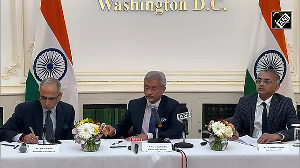If peace and stability is to come to South Asia, links between Pakistan's military, Inter-Services Intelligence and the violent extremist jihadi groups the ISI created, must be severed, said Steve Coll, president and CEO of The New America Foundation and Pulitzer Prize-winning author of Ghost Wars.
Testifying before the US Commission on International Religious Freedom on Capitol Hill, at a hearing titled Pakistan: The Threat of Religious Extremism to Religious Freedom and Security,' Coll said, "Why the United States failed in the past, and particularly since 9/11, in its policy toward Pakistan, was "because it has not enunciated clear standards of expectation that can be used to measure the attitudes and conduct of the Pakistani security services."
"It has been observed by many people that the United States wrote, essentially, a blank check to the Pakistani security services after 9/11," he said.
Coll said the "goal of US policy toward Pakistan is pretty easy to describe -- it is in the interest of the United States to promote a stable, modernising, democratic Pakistan that is at peace with itself and at peace with its neighbours, and, in pursuing that goal, to promote those leaders, institutions and forces within Pakistan that seek to revive and perfect the Pakistani Constitution that defined the country's identity and political system from its founding."
But he argued that "the United States has failed in its own policy-making when it has isolated and stepped away from that vision and those leaders in pursuit of its narrow security interests."
Coll said that now, he believed "there is an understanding in the Obama Administration and broadly in the Congress and elsewhere that the time has come to rebalance US policy to emphasize the pursuit of a stable, modernising, democratic constitutional Pakistan, not because it's an American idea but because it's a Pakistani idea."
He acknowledged that the problem now is that this constitutional order is under siege and undergoing considerable instability, and without precedent in recent Pakistani history, "particularly the role of an Islamist insurgency that has captured significant swathes of territory in a country."
Coll said for the United States, "in confronting this problem of instability and the pursuit of this constitutional order in these difficult circumstances has to also confront the role of the Pakistani security services historically in promoting, funding, arming, and equipping, sometimes with American cooperation, the very Islamist groups that now threaten that order."
He said "one of the real problems in American policy in the past has been trying to find an effective, consistent policy to engage with the Pakistani army and to encourage and at times if necessary coerce it to change its conduct in relations to these banned Islamist groups."
But Coll said, in the end, "the pursuit of a stable, normalising, democratic Pakistan is not going to be successful if it is vested in incremental changes in the conduct of the Pakistani security services alone."
He asserted that "the only way to achieve stability in South Asia in the end is through normalization between India and Pakistan and the integration of their two economies and societies. That's why the Kashmir negotiations matter, not in an end of themselves but as a pathway to normalization."
During the question and answer session, Coll said, "Where the United States and its allies and other partners of Pakistan can help to highlight the self-interest that the Pakistan army, and therefore ISI, has in normalisation (of its ties with India in place of trying to obtain strategic depth against India by using religious extremist groups to fight a proxy war), that's one obvious place to begin."
He explained that "on the sort of less aspirational side, it is the case that the Pakistan Army has indirectly been coerced into changing its conduct from time to time where it believes its own legitimacy is at stake," and pointed out to the time in the mid-1990s, when "the United States threatened to place Pakistan on the list of countries that sponsor international terrorism."
Coll also referred to the time after 9/11, when there was the "very famous interaction between the United States and Pakistan about which side it was on. And, you can argue that the Pakistan Army, in some of those cases, did the minimum necessary to preserve its legitimacy rather than making a full turn, but it did pay attention where its international legitimacy was at stake."
He recalled that during former President Pervez Musharraf's rule "by the time the army took the extraordinary steps that it did to enter into these negotiations over Kashmir, essentially threatening to reverse decades of policy in this negotiation with India, it was not coercion that brought them to the table -- it was aspiration."
Coll said, the Army, and Musharraf in particular, "wanted the international legitimacy, the credibility. He wanted to be celebrated at international events as a peacemaker. He wanted Oslo to pay attention to him."






 © 2025
© 2025